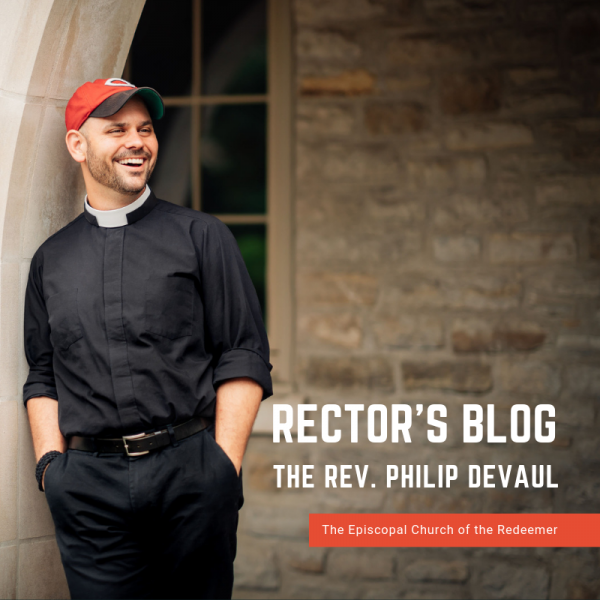Rector's Blog: Welcome to the Apocalypse

This is not The End. It’s a scary time, to be sure. Maybe you’re scared. My fear comes in waves. Mostly I’m fine, and then a wash of insecurity takes over and overwhelms me. It ebbs, though, and I’m back to mostly fine. I’m an extrovert whose job is people, so self-quarantining, not leaving the house, not getting to be with you in person means “mostly fine” is what I’m shooting for right now. We’re all feeling stress, anxiety, and uncertainty. We’re all experiencing the effects of that subversive benediction, “May you live in interesting times."
That said, everything we’re seeing about COVID-19 worldwide tells us that there will be a time after this pandemic, a time of healing and health, a time when we return to one another. We belong to each other, and we will get to live like that’s true again. This is not the end. This is not The End.
But this is an Apocalypse.
Wait, what?
Hear me out.
We’re trained to think that Apocalypse means the end of the world, or the end of civilization. But apocalyptic literature – whether it be the Book of Revelation or a zombie movie – has an explicitly different purpose. The word “apocalypse” means “to reveal”. The apocalyptic genre is about revealing. But it’s not revealing the future – it’s not a crystal ball – it’s revealing something that is already true about us. It’s revealing things about our culture we don’t want to admit.
In the biblical book of Revelation – perhaps the most misinterpreted, misused writing in all Scriptures – the thing being revealed is the large gap between how the Roman Empire sees itself and how God sees it. A nation that is constantly at war sees itself as inherently peaceful. An empire that subjugates and oppresses other cultures is proud of how enlightened and democratic it is. The violent and grotesque images of Revelation are used not to conjure up a hypothetical, doomed future, but to illustrate the grotesque violence with which people of the time had become complacent.
The first major zombie movie was George Romero’s Night of the Living Dead. In this apocalyptic tale, the dead rise from their graves and feast on people. It’s horrific. But what’s really horrific is how, when faced with this terror, people treat each other. The centerpiece of the story is a farmhouse where a slew of survivors have holed up for safety. It’s not long before they turn on each other, along gender, race, and class lines. This film, shot at the height of the Civil Rights movement in the U.S. is not about how dangerous imagined monsters are: it’s about how, in a crisis, we are confronted with how dangerous we can be.
We are living in an apocalypse. Not end times, but an apocalypse. Our whole world is being put on hold and we are left with ourselves. We are living with the revelation of our discomfort with inconvenient science, with the inadequacy of the way we care for the most vulnerable among us. What is being revealed to us is just how much our lives are structured to require constant movement, how we feel ashamed to rest, how we don’t know who we are when we’re not doing something. This is what an apocalypse feels like: Not like the end of the world, like the end of the world as we know it.
The idea of an apocalypse is that we are transformed by our acknowledgement of the truth of our lives. It’s the end of the world as we know it because we can’t unknow these things, and when we emerge from our quarantine and social distancing, we will look at each other differently, we will live differently, love differently.
While zombie movies are usually bleak and hopeless, the Book of Revelation offers a different picture of an apocalyptic world. In Revelation, the people who have been revealed the truth of what they’ve gotten wrong are also revealed the magnificent power of God’s love. They are revealed the mighty presence of Jesus, who lives in solidarity and unity with the most vulnerable. They are revealed the holiness and beauty of life. They are revealed the truth that, while much of their lives have been rife with violence and ignorance, they have also been capable of great faith, of kindness and charity, of grace and humanity. They are revealed the possibility of shared life rooted and grounded in Love – a love that nourishes and reconciles and heals the nations.
It can be tempting, in apocalyptic times, for us to succumb to cynicism about what we’re being revealed. This is when the wave of fear crests and crashes upon our hearts and minds, and we wonder if we’ll drown in panic.
Friend, if we are being revealed some of our ugliness, surely we are also being revealed our great beauty and strength. We are making sacrifices out of love. We are staying home to save the lives of people we don’t even know. We are binding together across political and social divides. We are finding space for quiet. We are finding out that, even when we aren’t doing something, we matter.
This is not The End. This is an apocalypse. May it reveal to you the whole truth of your belovedness, and may we all emerge from it with a fuller sense of just how utterly we belong to God, just how fully we are made for each other.
Tags: Rector's Blog